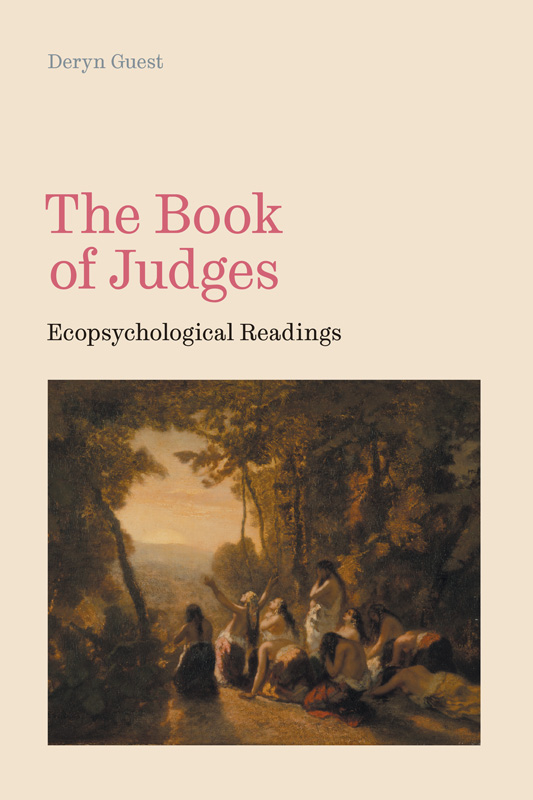The Book of Judges: Ecopsychological Readings
Published: Oct 2025
£68.00
Directly addressing ecological crises and our planetary future, Deryn Guest’s ecopsychological readings present an urgent and profoundly innovative challenge to biblical scholars all over the world. For, when organic connection between humans and the natural world has been lost, indeed even the capacity for such connection profoundly damaged, the complicity of the Bible and its interpretation in this loss must be scrutinised. No longer is it possible to write biblical commentary without asking similar questions to those posed in this volume.
The new dialogue partners Guest brings into the field of biblical scholars are most welcome and most needed. Applying theories of ecopsychology and employing a three-dimensional sensory amplification of scenes from the Book of Judges, Guest brings what has often been relegated as ‘background’ or ‘setting’ imaginatively into the foreground. Readers will find themselves reconsidering mountain-daughter encounters, pondering how standing stones can offer a word from the Gods, how trees and flames participate in navigating human-divine relations and how horses, foxes and lions become collateral damage in those dealings.
A surprising discovery is that a single thread runs through many of these scenes. Guest names it the ‘Changing of the Gods’. It involves the denigration and censure of all things ‘Canaanite’. As the not-us, the not-Christian, not-Jewish, not-Yahwistic, the ‘Canaanite’ is revealed as a projection of our own anxieties and demons on to a convenient Other. The significant consequence of such scapegoating is that we are alienated from the life-giving, numinous encounters that could otherwise happen on every green hill and under every green tree.
A compelling interdisciplinary study, this book is vital reading for all involved in biblical interpretation. It promises not only transformation of the field, but of scholars themselves as they reflect on their own complicity in writing commentaries that alienate their readers from the whisper of stones and the messages of trees.
The Book of Judges: Ecopsychological Readings
£68.00
Directly addressing ecological crises and our planetary future, Deryn Guest’s ecopsychological readings present an urgent and profoundly innovative challenge to biblical scholars all over the world. For, when organic connection between humans and the natural world has been lost, indeed even the capacity for such connection profoundly damaged, the complicity of the Bible and its interpretation in this loss must be scrutinised. No longer is it possible to write biblical commentary without asking similar questions to those posed in this volume.
The new dialogue partners Guest brings into the field of biblical scholars are most welcome and most needed. Applying theories of ecopsychology and employing a three-dimensional sensory amplification of scenes from the Book of Judges, Guest brings what has often been relegated as ‘background’ or ‘setting’ imaginatively into the foreground. Readers will find themselves reconsidering mountain-daughter encounters, pondering how standing stones can offer a word from the Gods, how trees and flames participate in navigating human-divine relations and how horses, foxes and lions become collateral damage in those dealings.
A surprising discovery is that a single thread runs through many of these scenes. Guest names it the ‘Changing of the Gods’. It involves the denigration and censure of all things ‘Canaanite’. As the not-us, the not-Christian, not-Jewish, not-Yahwistic, the ‘Canaanite’ is revealed as a projection of our own anxieties and demons on to a convenient Other. The significant consequence of such scapegoating is that we are alienated from the life-giving, numinous encounters that could otherwise happen on every green hill and under every green tree.
A compelling interdisciplinary study, this book is vital reading for all involved in biblical interpretation. It promises not only transformation of the field, but of scholars themselves as they reflect on their own complicity in writing commentaries that alienate their readers from the whisper of stones and the messages of trees.
When Psychology Meets the Bible
Published: Jun 2023
£85.00
This much-needed biblical studies encounter with the physiological and social sciences demonstrates ways these disciplines relate closely. A group of 17 scholars from across the world and from various psychological persuasions have considered texts—from many parts of the Hebrew Bible and New Testament. The essays recognise the human emotional need of the embodied mind in both literary characters and readers, and respond to it with empathic understanding.
The newness of interpretative approach in this collection anchors its understanding of the texts within recognised, scientific, psychological theories. Refreshing, even exciting, readings are discerned by focusing understanding of the human mind on those writing, and existing in, the biblical texts. This initiative is in significant contrast to a long history of implied psychological exegesis.
Where else, but in the Bible, can such a wide range of human actions, interactions, motivations and tragedies be studied in a variety of social situations? Showcasing the psychological implications of these texts serves as an invitation to continue this new momentum in research. At the same time, the freedom to explore the Bible psychologically has brought the most urgent and pressing psychological struggles to the surface, proving the relevance of all these biblical texts in our present world.
When Psychology Meets the Bible
£85.00
This much-needed biblical studies encounter with the physiological and social sciences demonstrates ways these disciplines relate closely. A group of 17 scholars from across the world and from various psychological persuasions have considered texts—from many parts of the Hebrew Bible and New Testament. The essays recognise the human emotional need of the embodied mind in both literary characters and readers, and respond to it with empathic understanding.
The newness of interpretative approach in this collection anchors its understanding of the texts within recognised, scientific, psychological theories. Refreshing, even exciting, readings are discerned by focusing understanding of the human mind on those writing, and existing in, the biblical texts. This initiative is in significant contrast to a long history of implied psychological exegesis.
Where else, but in the Bible, can such a wide range of human actions, interactions, motivations and tragedies be studied in a variety of social situations? Showcasing the psychological implications of these texts serves as an invitation to continue this new momentum in research. At the same time, the freedom to explore the Bible psychologically has brought the most urgent and pressing psychological struggles to the surface, proving the relevance of all these biblical texts in our present world.
Through the ‘I’-Window: The Inner Life of Characters in the Hebrew Bible
Published: Mar 2011
£60.00
It is often said that the inner life of characters in the Hebrew Bible is inaccessible to us, and that we can know little or nothing about how they felt and thought. In this study, original in both its scope and its method, Barbara Leung Lai shows how wrong that assumption is. She directs our attention to the many places where her chosen characters, Daniel, Isaiah, and Yahweh, speak of themselves, using the first-person 'I' voice, and finds those to be a unique point of entry, or window, into the interiority of the characters.
To construct an interior profile of these characters, Leung Lai develops an integrated methodology of psychological exegesis, drawing upon psychological perspectives of personality, Bakhtinian views of polyphony and dialogism, current studies of emotion, self and selfhood, and the empirics of reading under the rubric of reader-response literary criticism.
From these perspectives, Leung Lai can identify in Daniel two primary realms in his inner identity-seeing and emotive experiencing -- and can characterize Daniel's interior world as a world of paradoxes, of seeing without comprehending, hearing without the capacity to respond. Isaiah, on the other hand, exhibits a broad spectrum of emotions, from love, intimacy, joy and empathy to a sense of being under divine constraint, and to mourning, lament, doubt, distress, helplessness and despair. The prophet exhibits a profound sense of selfhood and subtle inner depths. The character of Yahweh is found to be most striking for its inner conflicts, with its frustrations, disappointments, pain and suffering.
This groundbreaking book will stimulate many readers to a new appreciation of characterization in the Hebrew Bible.
Through the ‘I’-Window: The Inner Life of Characters in the Hebrew Bible
£60.00
It is often said that the inner life of characters in the Hebrew Bible is inaccessible to us, and that we can know little or nothing about how they felt and thought. In this study, original in both its scope and its method, Barbara Leung Lai shows how wrong that assumption is. She directs our attention to the many places where her chosen characters, Daniel, Isaiah, and Yahweh, speak of themselves, using the first-person 'I' voice, and finds those to be a unique point of entry, or window, into the interiority of the characters.
To construct an interior profile of these characters, Leung Lai develops an integrated methodology of psychological exegesis, drawing upon psychological perspectives of personality, Bakhtinian views of polyphony and dialogism, current studies of emotion, self and selfhood, and the empirics of reading under the rubric of reader-response literary criticism.
From these perspectives, Leung Lai can identify in Daniel two primary realms in his inner identity-seeing and emotive experiencing -- and can characterize Daniel's interior world as a world of paradoxes, of seeing without comprehending, hearing without the capacity to respond. Isaiah, on the other hand, exhibits a broad spectrum of emotions, from love, intimacy, joy and empathy to a sense of being under divine constraint, and to mourning, lament, doubt, distress, helplessness and despair. The prophet exhibits a profound sense of selfhood and subtle inner depths. The character of Yahweh is found to be most striking for its inner conflicts, with its frustrations, disappointments, pain and suffering.
This groundbreaking book will stimulate many readers to a new appreciation of characterization in the Hebrew Bible.




